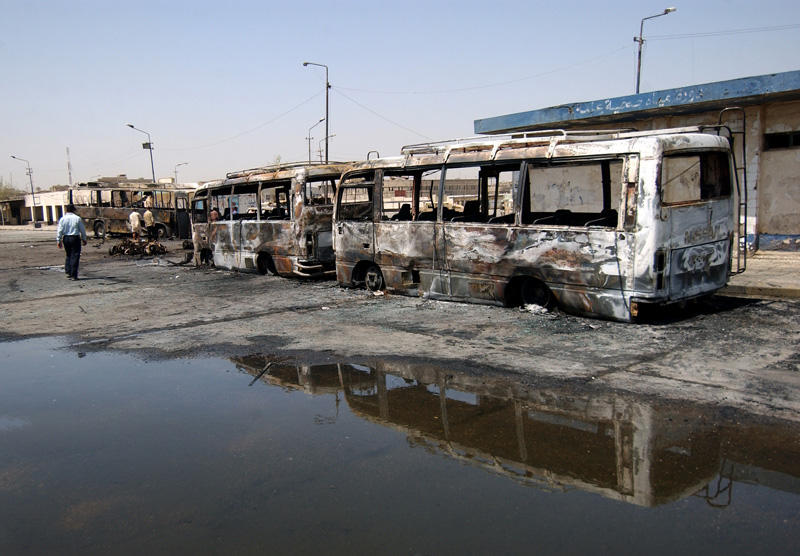Terrorism Study: ISIS Isn’t the Deadliest Extremist Group
Global Terrorism Index Offers Surprises That Can Improve Policies
Worldwide deaths from terrorist incidents jumped 80 percent in 2014 compared with the year before and were concentrated in five major conflict zones, according to the third annual Global Terrorism Index, released November 17. While that conclusion was unsurprising, the index included less obvious findings with implications for policy makers who have to tailor solutions to specific countries and regions, according to experts who discussed the study at the U.S. Institute of Peace.

Data in the index help differentiate between causes of terrorist incidents within countries and those that are transnational, said Georgia Holmer, director of countering violent extremism at USIP.
“Violent extremists have [harnessed] their agenda to already existing [conflict] dynamics and profound structural challenges,” Holmer said. “It’s important that we separate out the problem set of what happens in Iraq and Nigeria from what happens in Paris and London and the threats that face us domestically. Not only are the problems different but solutions are different.”
“Good data can be used to help us make sense of complex problems and counter unfounded conventional wisdoms.” –Michael Jensen, data collection manager for the Global Terrorism Database.
Of the 32,658 terrorism-related deaths in 2014, 78 percent occurred in Nigeria, Syria, Iraq, Pakistan and Afghanistan, according to the index. The Australia-based Institute for Economics and Peace produces the index, using data from the Global Terrorism Database, a U.S. government-backed project based at the University of Maryland.
The rise in fatalities is the largest in 15 years, according to the index and an accompanying report released just days after the Islamic State, or ISIS, killed 172 people with its attacks in Paris and Beirut. While ISIS extremists have dominated headlines in the past year, killing 6,073 people in 2014, the Nigerian group Boko Haram was even deadlier, the report said. Boko Haram’s attacks killed 6,644 people, 77 percent of them private citizens.
The index and report, which studied 162 countries, put the problem of terrorism into context in other ways. It estimated global economic damage from terrorism at about $53 billion last year, a ten-fold increase since 2000. It found that worldwide deaths from terrorist attacks in 2014 were far outnumbered by an estimated 437,000 homicides.
Data Can Help Policy
These data can help policy makers improve their decision-making capabilities, the experts said at USIP. The findings on Boko Haram could help policy makers in Africa take steps to protect their citizens, panelists said. And data on the lone-wolf attacks that dominate in the West could show what helps law enforcement agencies stop such attacks.
Having good data on terrorist incidents also helps in formulating policy when multiple international partners are involved, Erdberg said.
Good data can help “confront counterproductive behavior,” she said. Sometimes “it’s uncomfortable to talk in the policy realm about what doesn’t work, especially with international partners.” But when there’s data, even if it’s not entirely foolproof, “it’s able to change the conversation a little bit more than what it would be otherwise from a values perspective, so data has incredibly important role.”
The Global Terrorism Database compiles details on 140,000 terrorist attacks around the globe. Researchers work from open sources, collecting as many as 2 million news reports daily and distilling them to about 25,000 articles that are manually read every month.
The Global Terrorism Index found that political violence committed by the state and the presence of a broader armed conflict were factors closely correlated with terrorist violence. About 92 percent of terrorist attacks over the past 25 years occurred in countries where political violence was backed by the state, the study found.
Countering 'Unfounded' Conventions
In the richer countries that are part of the Organization for Economic Cooperation and Development, socio-economic factors like youth unemployment, belief in democracy, drug crime and attitudes toward immigration were more strongly correlated with terrorism, leading to more so-called lone-wolf attacks, the study said.
In other countries, corruption and a weak business environment were correlated with terrorism, it said.
Better information helps change entrenched narratives about what works in combating terrorism, said Michael Jensen, data collection manager for the Global Terrorism Database.
“Data can be an important component in our conversations about violent extremism and how to counter it,” Jensen said. “Good data can be used to help us make sense of complex problems and counter unfounded conventional wisdoms and improve our responses to difficult challenges.”
That is also the goal behind USIP’s recent effort with the State Department and the U.S. Agency for International Development in launching a collaborative research program called Researching Solutions to Violent Extremism or RESOLVE. The goal is to bring together individuals and research organizations from around the world, including those focused on local extremist groups, to draw broader lessons for policy makers.
The project aims to understand violent extremism at the community level as well as the role of the state in its relationship with such communities, said Andrew Blum, vice president of planning, learning and evaluation at USIP.
While policy making “is never going to be purely data driven…the better the data, the more seriously it’s likely to be taken,” and the more it can help counter conventional wisdom, Erdberg said.



